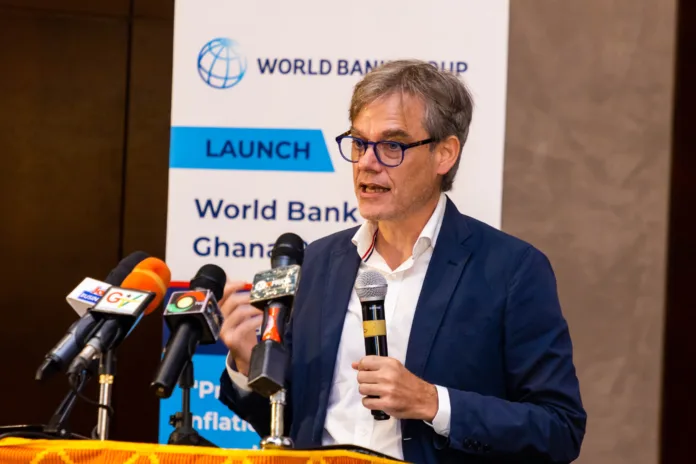
World Bank has disclosed that Ghana’s economy is expected to recover its potential by the 2025.
According to the World Bank, the situation is as a result of a combination of domestic imbalances and external shocks in 2022, led to macroeconomic challenges in Ghana.
The World Bank added that the year was marked by currency depreciation, rising inflation, and tumbling investor confidence.
Pre-existing fiscal vulnerabilities such as mounting debt burden, a rigid budget weakened by high energy sector costs and chronically low public revenues, were deepened by difficult global economic conditions notes the World Bank’s latest Economic Update.
The report titled “Price Surge: Unraveling Inflation’s Toll on Poverty and Food Security” states that Ghana faces an extremely challenging outlook, and the economic situation is likely to remain challenging before it rebounds.
Economic growth is projected to slow down to 1.5% in 2023 and remain depressed in 2024 at 2.8% but the economy is expected to recover to its potential growth by 2025.
“As a result of efforts to address macroeconomic instability, corrective fiscal and monetary policies are expected to influence total demand and slow down non-extractive GDP growth”, said Pierre Laporte, World Bank Country Director for Ghana, Liberia, and Sierra Leone “High inflation, increased interest rates, and macroeconomic uncertainties will keep private consumption and investment growth below pre-pandemic levels, leading to subdued non-extractive growth in the short term; but growth will begin to recover to its potential by 2025 as drag from fiscal consolidation fades and macroeconomic stabilization and structural reforms start bearing fruit.”
The report recommends that in addition to managing the immediate macroeconomic crisis, the authorities would be well served by embarking on structural reforms to tackle its root causes, boost economic growth, and build economic resilience:
The report calls for Ghana to sustainably collect more domestic revenue, notably by streamlining tax incentive regimes and improving revenue administration.
It suggests that Ghana could implement tighter expenditure controls to improve budget execution accuracy and prevent new arrears accumulation.
The report states that the government needs to fully address the energy sector shortfalls, which continue to threaten fiscal sustainability, and it calls on the government to extend, expand, and thoroughly implement the Energy Sector Recovery Programme.
Rebuilding the financial sector’s capital buffers, will promote financial stability and development. As based on recently published audited financial statements, the DDEP has eroded banks’ capital buffers and some banks are undercapitalized or insolvent.
It calls on the government to boost the inflow of FDI by enhancing the investment climate through improvements in transparency, accessibility and quality of business regulation and regulatory governance.
On climate change adaptability, the report recommends that the government draws from recommendations of the World Bank’s recent Country Climate and Development Report (CCDR) to prioritize investments that maximize resilience benefits at an affordable cost.
“Macroeconomic shocks, particularly inflation tend to affect the poor the most. The next two years will be very tricky for Ghana’s poverty reduction efforts. Without bringing the economy back on track, no meaningful poverty reduction can happen. Concurrently, safety nets to protect the most vulnerable need to be enhanced to ensure sustainable poverty reduction and shared prosperity.” said Kwabena Gyan Kwakye, World Bank Economist and co-author of the report.
“Expanding and increasing transfers of the Livelihood Empowerment Against Poverty (LEAP) could ensure the poorest are able to cope and build resilience to future shocks.”
The report also indicates that high inflation in 2022 has had significant effects on food security and poverty in Ghana and has eroded the purchasing power of Ghanaian households, leading to a deterioration in living standards and ultimately, worsening poverty and food insecurity. Simulations suggest that in 2022 nearly 850,000 Ghanaians were pushed into poverty due to rising prices and the loss in purchasing power.
“In the longer term, to mitigate the impact of inflation on food security, policymakers must enable farmers to adjust to global demand and take advantage of market opportunities” said Ashwini Sebastian, Senior Agricultural Economist, and co-author “This is particularly relevant since many of the poor are farming households. Policies should therefore be evidence based and aimed at alleviating the different constraints farmers face.”
Medium-to-long term policy actions may include the channeling of investments in agriculture research and technology transfers to help increase productivity and reduce production costs, as well as improve the quality and safety of food. Additionally, on climate change, it is essential that the government invests in climate smart agriculture initiatives which can help farmers adapt to changing weather patterns. Promoting a sustainable agriculture, resilient to climate change, can help farmers withstand future shocks.
In addition to supporting higher domestic food production, policies need to target opening the country to more effective integration with global food supply chains. Programs may seek to foster regional and global trade to improve the availability and affordability of food by reducing barriers to trade, promoting regional integration, and increasing market transparency. Also, policies that seek to reduce market distortions such as subsidies, taxes, and price controls can improve market efficiency and reduce food waste.
Source: Ghana/Starrfm.com.gh/103.5FM



